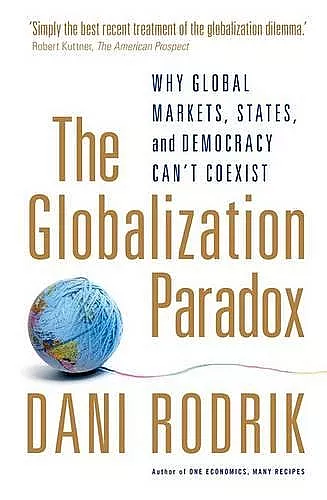The Globalization Paradox
Why Global Markets, States, and Democracy Can't Coexist
Format:Paperback
Publisher:Oxford University Press
Published:17th May '12
Should be back in stock very soon

For a century, economists have driven forward the cause of globalization in financial institutions, labour markets, and trade. Yet there have been consistent warning signs that a global economy and free trade might not always be advantageous. Where are the pressure points? What could be done about them? Dani Rodrik examines the back-story from its seventeenth-century origins through the milestones of the gold standard, the Bretton Woods Agreement, and the Washington Consensus, to the present day. Although economic globalization has enabled unprecedented levels of prosperity in advanced countries and has been a boon to hundreds of millions of poor workers in China and elsewhere in Asia, it is a concept that rests on shaky pillars, he contends. Its long-term sustainability is not a given. The heart of Rodrik's argument is a fundamental 'trilemma': that we cannot simultaneously pursue democracy, national self-determination, and economic globalization. Give too much power to governments, and you have protectionism. Give markets too much freedom, and you have an unstable world economy with little social and political support from those it is supposed to help. Rodrik argues for smart globalization, not maximum globalization.
Review from previous edition This book takes on the biggest issue of our time - globalization - and eloquently enlarges the debate about the extent and limits of global cooperation * Gordon Brown, MP *
In this powerfully argued book, Dani Rodrik makes the case for country-specific paths to economic development and saner, more sustainable forms of growth. A provocative look at the excesses of hyper-globalization, The Globalization Paradox should be required reading for those who seek to prevent the financial crises and unfair trade practices that feed the backlash against open markets * Nouriel Roubini, co-author of Crisis Economics: A Crash Course in the Future of Finance *
Dani Rodrik may be globalization's most prominent - and most thoughtful - gadfly. In The Globalization Paradox, he wonders aloud whether extreme globalization undermines democracy - and vice-versa. Read it and you'll wonder, too * Alan S. Blinder, former Vice Chairman of the Board of Governors of the U.S. Federal Reserve *
His excellent new book is a sequel to an earlier book about the often disruptive impact of international trade on national labor markets and social policies. The new book develops and extends this theme to include financial globalization... Rodrik concludes by considering how the world economy might be reformed * Robert Rowthorn, Finance and Development *
His message is nuanced and rigorous, drawing on history, logic and the latest economic data, he manages to convey it in simple, powerful prose tht any reader can follow * Steven Pearlstein, The Washington Post *
Simply the best recent treatment of the globalization dilemma. . . he gives us nothing less than a general theory of globalization, development, democracy, and the state. The book provides the pleasure of following a thoughtful, critical mind working through a complex puzzle. Rodrik writes in highly friendly and nontechnical prose, blending a wide-ranging knowledge of economic history and politics and a gentle, occasionally incredulous, skepticism about the narrow and distorting lens of his fellow economists * Robert Kuttner, The American Prospect *
ISBN: 9780199652525
Dimensions: 233mm x 152mm x 19mm
Weight: 544g
370 pages